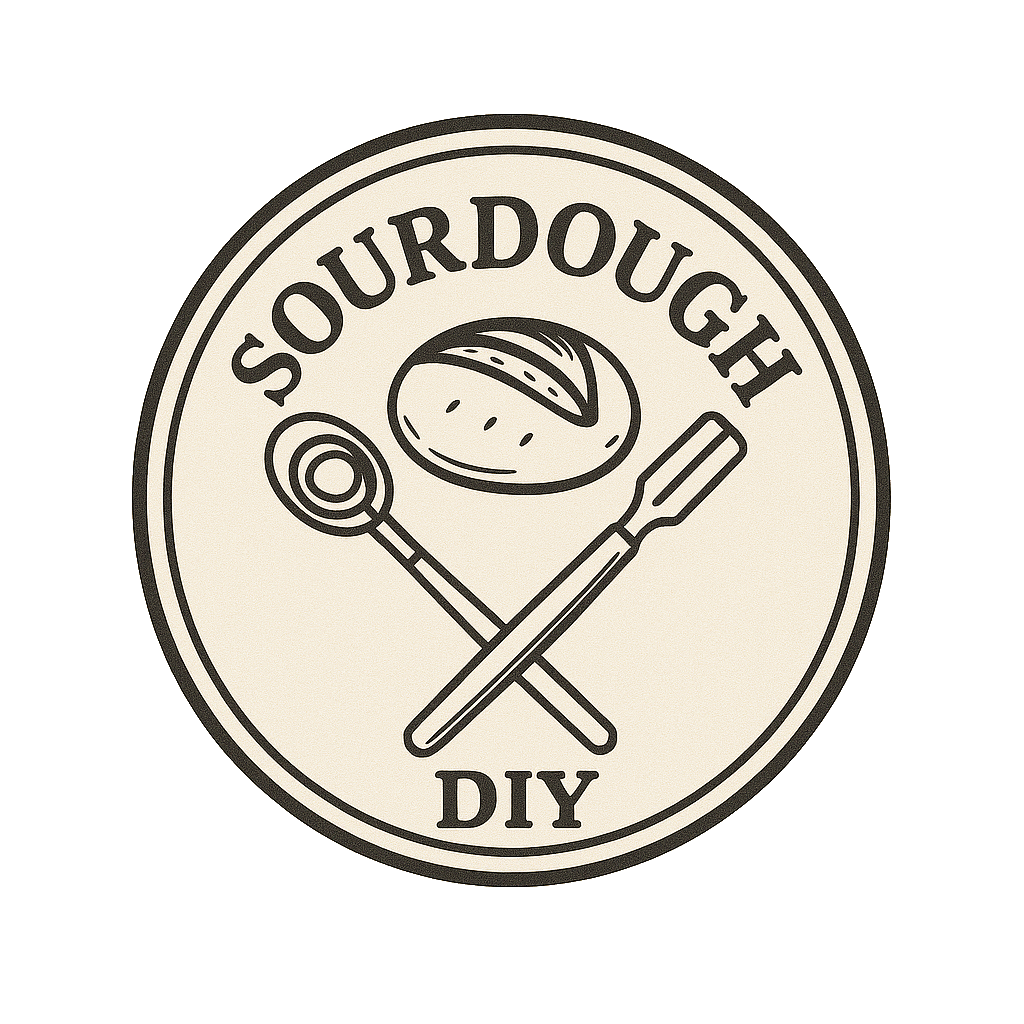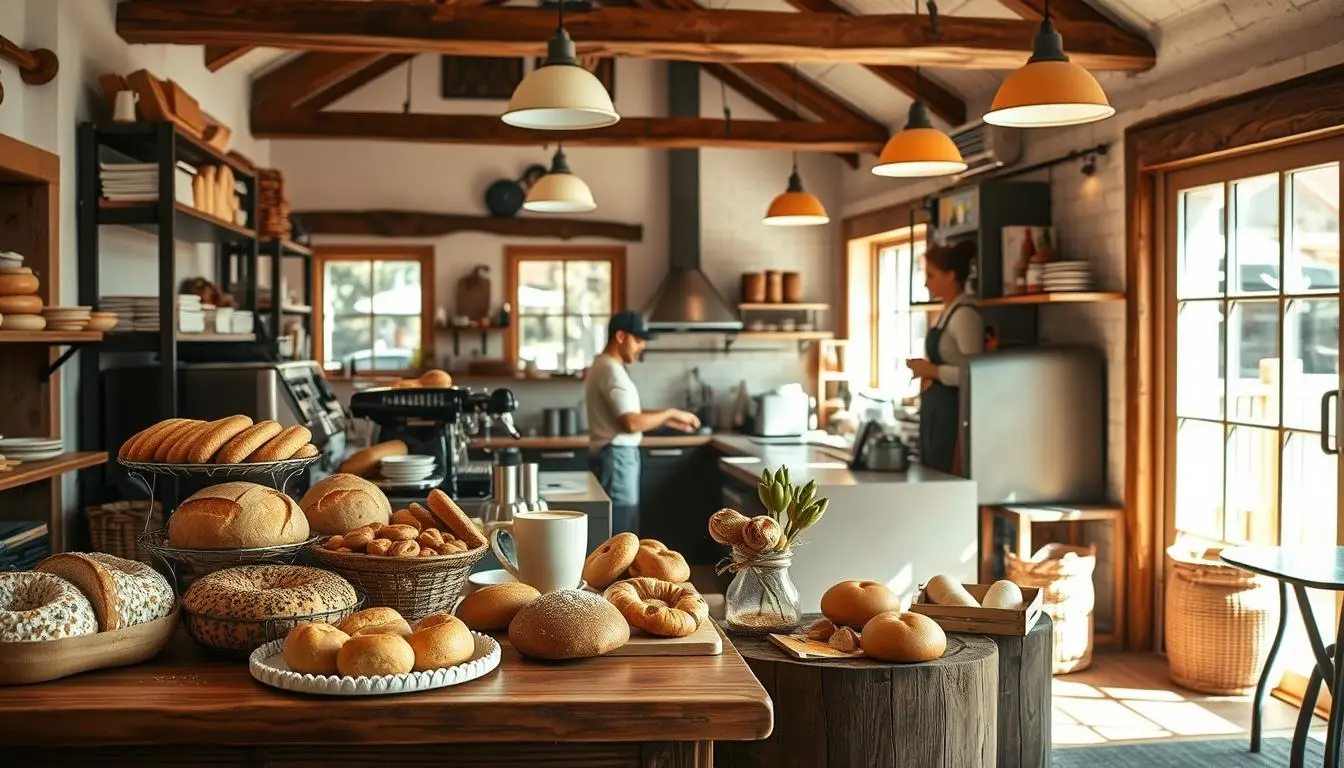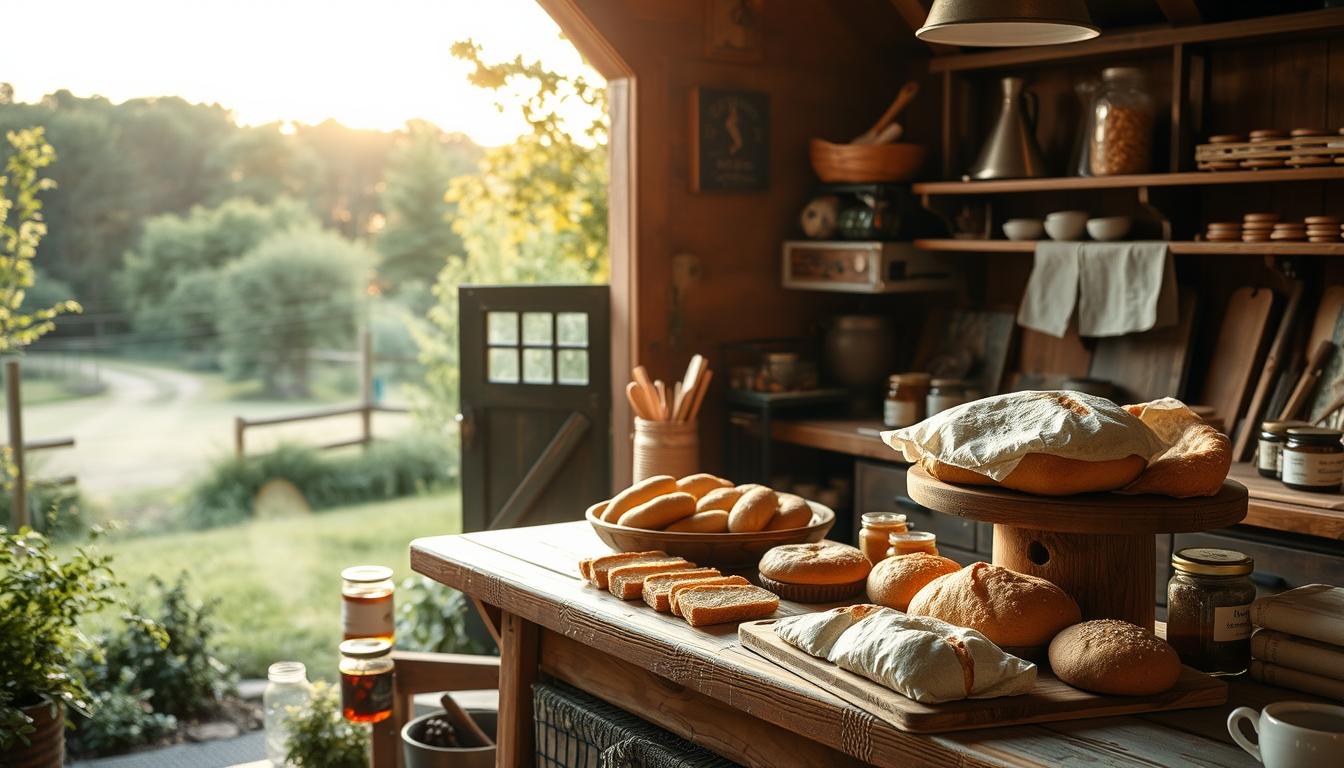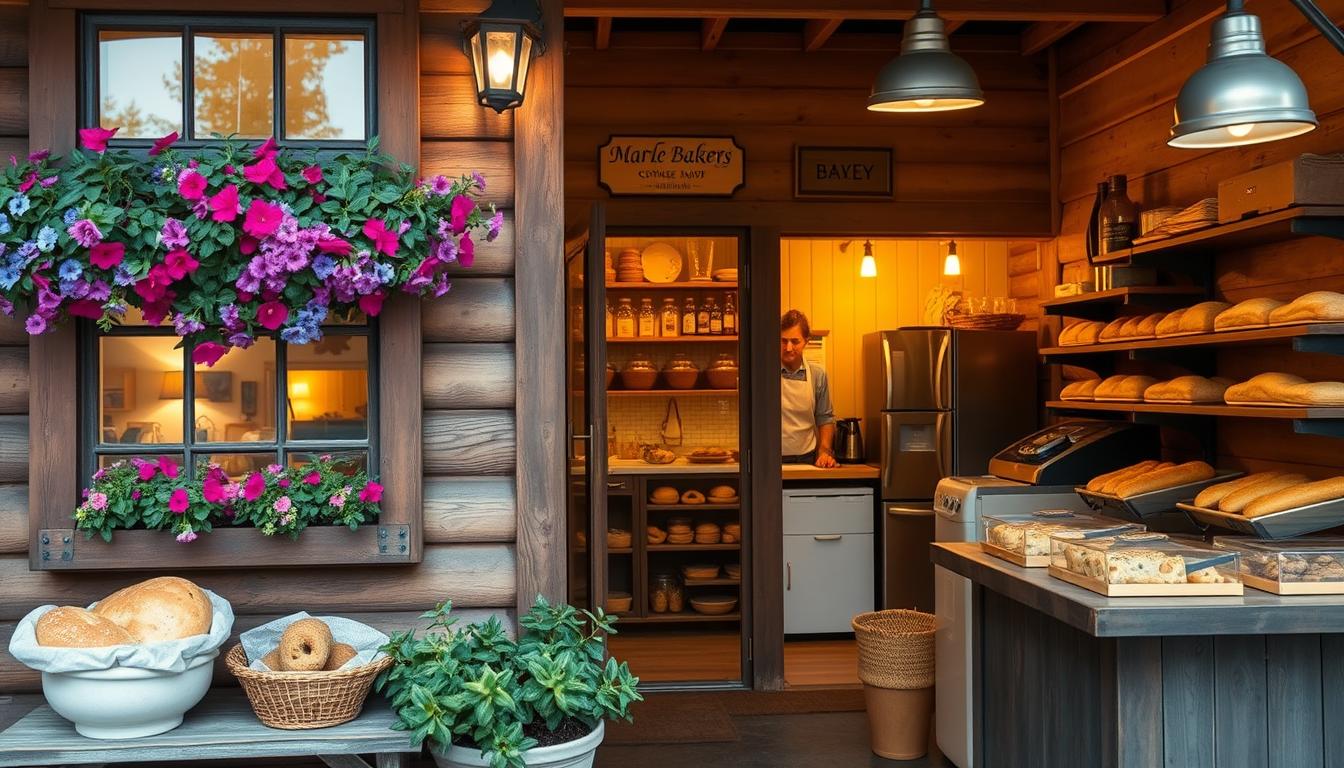A micro bakery offers a unique opportunity to start small and grow, allowing you to perfect your craft while building a loyal customer base. With the rise of cottage food laws and home-based businesses, it’s now easier than ever to get started.
By focusing on quality, creativity, and customer service, you can establish a successful bakery business that stands out in the market.
Key Takeaways
- Understand the benefits of a home-based bakery business
- Learn how to comply with cottage food laws
- Discover the importance of quality and creativity in a micro bakery
- Develop a customer service strategy for your small business
- Explore opportunities for growth and expansion
What Is a Micro Bakery?
In recent years, micro bakeries have emerged as a significant trend in the American baking industry. These small-scale bakeries are redefining the art of baking by focusing on quality, locality, and personalized products.
Definition and Scale
A micro bakery is typically characterized by its small size and limited production capacity. Unlike large commercial bakeries, micro bakeries often operate from home kitchens or small dedicated spaces, adhering to local regulations and cottage food laws. This setup allows micro bakeries to maintain a personal touch and flexibility in their offerings.
The Growing Trend of Micro Bakeries in America
The trend of micro bakeries in America is on the rise, driven by consumer demand for artisanal and locally sourced products. Micro bakeries are able to innovate and experiment with new recipes, catering to niche markets and building a loyal customer base.
| Characteristics | Micro Bakery | Large Commercial Bakery |
|---|---|---|
| Production Scale | Small, Limited Batches | Large, Mass Production |
| Operation Location | Home Kitchen or Small Space | Commercial Facility |
| Product Focus | Artisanal, Locally Sourced | Mass Market, Standardized |
Benefits of Starting a Micro Bakery
Embarking on the journey of starting a micro bakery comes with a multitude of benefits. For aspiring bakers, it presents an opportunity to turn their passion into a viable business.
Low Startup Costs
One of the most significant advantages of a micro bakery is its low startup costs. Unlike large-scale bakeries, micro bakeries require minimal initial investment, making it more accessible to individuals who want to start small.
Work-Life Balance Opportunities
Running a micro bakery allows for flexible scheduling, enabling owners to achieve a better work-life balance. This flexibility is particularly beneficial for those who value their personal time or have other commitments.
Creative Freedom and Expression
A micro bakery provides the creative freedom to experiment with new recipes and products. This freedom allows bakers to express their creativity and cater to their customers’ preferences, making the business more fulfilling.
Some key benefits of starting a micro bakery include:
- Low initial investment
- Flexibility in operations
- Opportunity for creative expression
Essential Steps for Starting a Micro Bakery
Starting a micro bakery is an exciting venture that demands meticulous preparation. As a budding entrepreneur in the baking industry, it’s crucial to understand the foundational steps that will lead to success.
Assessing Your Baking Skills
Before diving into the business side, it’s essential to assess your baking skills. Consider your experience with different types of baked goods, your ability to innovate, and your consistency in producing high-quality products. As noted by a successful micro bakery owner, “Understanding your strengths and weaknesses in baking is key to creating a product line that stands out.”
Creating a Solid Business Plan
A solid business plan is the backbone of any successful venture. It should outline your business model, target market, financial projections, and marketing strategies. This plan will serve as a roadmap, guiding your decisions and helping you stay on track.
Setting Realistic Goals and Timelines
Setting realistic goals and timelines is vital for measuring progress and staying motivated. Break down your long-term goals into smaller, achievable milestones, and establish a timeline for achieving them. This will help you stay focused and adapt to any challenges that arise.
By following these essential steps, you’ll be well on your way to establishing a successful micro bakery.
Understanding Legal Requirements
Compliance with legal standards is not just about avoiding trouble; it’s a foundation for a thriving micro bakery. As you start your business, understanding the legal landscape is crucial for long-term success.
Cottage Food Laws in the United States
Cottage food laws vary by state and dictate what types of baked goods can be sold from home. Some states allow the sale of dry goods like cookies and granola, while others permit a broader range of products. It’s essential to check your state’s specific regulations.
For instance, California allows the sale of baked goods, candies, and jams under its cottage food law, provided the annual sales do not exceed $75,000. Researching and understanding these laws will help you determine the scope of your operations.
Health Department Regulations
Health department regulations are critical for ensuring consumer safety. These regulations often require micro bakeries to adhere to specific sanitation and safety standards, even if operating from home.
- Regular inspections may be conducted to ensure compliance.
- Proper food handling and storage practices are mandatory.
Business Licenses and Insurance Needs
Securing the necessary business licenses and insurance is vital. Licenses vary by location but typically include a business license and possibly a food handler’s permit.
Insurance protects your business from unforeseen circumstances like equipment failure or customer illness. Consider liability insurance and business interruption insurance to safeguard your operations.
Record-Keeping Requirements
Maintaining accurate records is not only a legal requirement but also a best practice for managing your business effectively. This includes financial records, ingredient sourcing, and sales data.
By understanding and complying with these legal requirements, you can establish a solid foundation for your micro bakery, ensuring a successful and sustainable business.
Setting Up Your Micro Bakery Space
A well-organized micro bakery space can significantly enhance productivity and product quality. As you start your micro bakery, it’s essential to consider the space where your baked goods will be made.
Home Kitchen Considerations
Using your home kitchen for a micro bakery can be cost-effective, but it’s crucial to ensure it meets local health and safety regulations. Some key considerations include:
- Ensuring your kitchen is clean and sanitized regularly
- Separating your baking area from your living space
- Complying with local cottage food laws and regulations
Dedicated Space Options
If your home kitchen isn’t suitable, consider renting a dedicated commercial kitchen space. This can provide:
- Access to commercial-grade equipment
- A separate area for baking, away from home distractions
- Flexibility to scale your production as needed
Storage and Ingredient Management
Effective storage and ingredient management are vital for maintaining quality and efficiency. Consider:
- Using airtight containers for dry ingredients
- Organizing your storage to minimize waste and maximize space
- Labeling and dating ingredients to ensure FIFO (First In, First Out) usage
By carefully planning your micro bakery space, you can create an efficient and effective environment that supports your baking goals.
Essential Equipment for Your Micro Bakery
Investing in the right equipment is crucial for the success of your micro bakery. The quality of your baked goods and the efficiency of your operations depend heavily on the machinery and tools you use.
Ovens (Domestic vs. Commercial like Rofco B40)
Choosing the right oven is vital. Domestic ovens may suffice for small operations or for bakers just starting out, but commercial ovens like the Rofco B40 offer more consistency and higher capacity. The Rofco B40, for instance, is known for its reliability and ability to produce consistent results, making it a popular choice among micro bakers.
Mixers (Hand Mixing vs. Spiral or Commercial Mixers)
Mixers are another essential piece of equipment. While hand mixing is feasible for small batches, spiral mixers or commercial stand mixers can significantly reduce labor and improve dough consistency. For larger or more ambitious micro bakeries, investing in a commercial mixer is a wise decision.

Proofing and Baking Tools (Bannetons, Tins, Lincat)
Proofing and baking tools, such as bannetons for artisan breads and Lincat ovens for baking, are critical for producing high-quality products. Bannetons give bread its characteristic shape and crust, while Lincat ovens provide consistent baking results.
Starting Small and Scaling Up
It’s advisable to start with essential equipment and scale up as your micro bakery grows. This approach helps manage initial investment costs and allows you to refine your processes. A comparison of initial vs. scaled-up equipment needs is shown below:
| Equipment | Initial Investment | Scaled-Up Investment |
|---|---|---|
| Ovens | Domestic Oven | Commercial Oven (e.g., Rofco B40) |
| Mixers | Hand Mixer/Stand Mixer | Spiral/Commercial Mixer |
| Proofing Tools | Basic Bannetons | Professional Bannetons & Proofing Baskets |
As your micro bakery expands, so too will your equipment needs. Planning for this growth from the outset will help ensure a smooth transition.
“The right equipment can make all the difference in the quality and consistency of your baked goods. Investing in good equipment from the start can save you time and money in the long run.”
Developing Your Signature Product Line
Creating a signature product line is a key step in establishing your micro bakery’s identity. This involves crafting a selection of baked goods that not only taste amazing but also reflect your bakery’s unique character and values.
Sourdough and Artisan Breads
Sourdough and artisan breads are staples for many bakeries, offering a depth of flavor and texture that is hard to replicate with mass-produced bread. Developing a sourdough starter can be a rewarding process, and using it to create breads with unique flavor profiles can set your bakery apart. Consider experimenting with different types of flours and fermentation times to create distinctive artisan breads.
Sweet Offerings
Sweet treats like brioche, cinnamon rolls, and sticky buns are always in demand. These items can be both a great way to attract customers and a significant source of revenue. Experimenting with different ingredients and presentation styles can help your sweet offerings stand out.
Pastries and Specialty Items
Pastries, such as croissants, are another area where you can showcase your baking skills. Laminating dough to create flaky, buttery croissants requires practice, but the result can be a crowd-pleaser. Consider offering seasonal or specialty pastries to keep your offerings fresh and exciting.
Finding Your Niche Products
Identifying niche products that resonate with your target audience is crucial. This might involve experimenting with different flavors, ingredients, or baking techniques to create something unique. Listening to customer feedback and adapting your product line accordingly can help you refine your offerings and build a loyal customer base.
Mastering the Baking Process
Mastering the baking process is crucial for any micro bakery aiming to produce high-quality products consistently. This involves understanding various techniques and practices that ensure the production of superior baked goods. A well-mastered baking process is the backbone of a successful micro bakery.
Fermentation Techniques and Bulk Fermentation
Fermentation techniques play a critical role in developing the flavor and texture of baked goods. Bulk fermentation, in particular, is a process that allows the dough to rest and ferment, enhancing the overall quality of the bread. According to expert bakers, “The longer, slower fermentation process develops a more complex flavor profile.”
“The art of bread making is not just about mixing ingredients together; it’s about understanding the science behind the fermentation process.”
Batch Planning and Production Scheduling
Effective batch planning and production scheduling are essential for maintaining consistency and meeting customer demand. By planning batches in advance, micro bakeries can ensure a steady supply of fresh products. This also allows for better quality control, as bakers can monitor each batch closely.
Quality Control and Consistency
Maintaining quality control is vital for any micro bakery. This involves regularly checking the quality of ingredients, the baking process, and the final products. Consistency is key to building a loyal customer base.
Managing Baking Time and Temperature
Managing baking time and temperature is crucial for achieving the perfect bake. Incorrect temperatures or baking times can result in subpar products. By closely monitoring these factors, micro bakeries can ensure that their products are consistently of high quality.
Pricing Strategies for Profitability
Pricing is a pivotal element in the success of a micro bakery, influencing both customer perception and profitability. Effective pricing strategies require a deep understanding of costs, market conditions, and customer willingness to pay.
Calculating Ingredient Costs and Labor
To set prices that ensure profitability, you must accurately calculate your costs, including ingredient costs and labor expenses. Ingredient costs can fluctuate based on seasonality and supplier prices, so it’s crucial to regularly review and adjust your pricing accordingly. Labor costs should also be considered, as they directly impact the bottom line. Efficient production processes can help minimize labor costs without compromising quality.
Competitive Pricing Research
Conducting competitive pricing research is vital to understand how your prices compare to those of other bakeries in your area. This involves analyzing the prices of similar products offered by competitors and determining how your products differ in terms of quality, uniqueness, and value proposition. This research will help you position your micro bakery effectively in the market.

Value-Based Pricing for Artisan Products
For artisan products, value-based pricing can be an effective strategy. This approach involves setting prices based on the perceived value of your products to customers. Factors influencing perceived value include the quality of ingredients, craftsmanship, and the uniqueness of your offerings. By highlighting these aspects, you can justify higher prices for your artisan products.
Building Sustainable Margins
Building sustainable margins requires a balance between pricing and costs. It’s not just about maximizing profit margins but ensuring that your pricing strategy is sustainable in the long term. This involves regularly reviewing your cost structure, market conditions, and customer feedback to make necessary adjustments. By doing so, you can maintain profitability while also ensuring customer satisfaction and loyalty.
Marketing Your Micro Bakery
In the world of micro bakeries, marketing is not just about selling products, it’s about building a community. Effective marketing strategies will help you connect with local customers, create a loyal following, and differentiate your bakery from larger competitors.
Building a Local Customer Base
To start, focus on building a strong local customer base. This can be achieved by participating in local events, partnering with nearby businesses, and offering samples or promotions that attract foot traffic. Consider the following strategies:
- Host baking workshops or classes to engage with the community and showcase your expertise.
- Partner with local coffee shops or restaurants to offer your baked goods.
- Use local farmers’ markets to display and sell your products.
Leveraging Social Media and Facebook Groups
Social media platforms, especially Facebook Groups, can be powerful tools for micro bakeries. Create a business page and join local groups to share your products, promotions, and events. Engage with your followers by responding to comments and messages promptly.
Creating a Simple Website or Online Presence
A simple website can significantly enhance your online presence. Include essential information such as your product offerings, pricing, and contact details. You can also use online platforms like Instagram to showcase your products and interact with customers.
Word-of-Mouth and Community Engagement
Word-of-mouth is a potent marketing tool for micro bakeries. Encourage satisfied customers to share their experiences by offering incentives such as discounts or free products for referrals. Community engagement is key to building a loyal customer base.
- Host events or baking classes to foster a sense of community.
- Participate in local charity events or fundraisers.
- Respond to customer feedback to show you value their opinions.
Distribution and Selling Methods
Distribution and selling methods are key components of a successful micro bakery business plan. To effectively reach your target audience and increase sales, you’ll need to explore different channels that align with your business model and customer preferences.
Direct-to-Consumer Sales
One of the most straightforward methods is direct-to-consumer sales, where you sell your baked goods directly to customers, either in-person or online. This approach allows you to maintain control over the customer experience and build a loyal customer base. You can sell directly through your website, social media platforms, or in-person at your bakery or events.
Farmers Markets and Local Events
Participating in farmers markets and local events is another effective way to sell your products. These venues provide an opportunity to showcase your baked goods to a wider audience, receive immediate feedback, and build brand awareness. Make sure to comply with local regulations and obtain any necessary permits.
Subscription Models and Pre-Orders
Implementing subscription models and pre-orders can help you manage production and ensure a steady income stream. Customers can sign up for regular deliveries or order in advance for specific events or dates. This approach also allows you to plan your inventory and production more efficiently.
Collaborations with Local Businesses
Collaborations with local businesses, such as cafes, restaurants, and specialty food stores, can expand your reach and provide additional revenue streams. Consider partnering with businesses that share your brand values and target audience to create mutually beneficial opportunities.
Conclusion: Taking the Leap into Your Micro Bakery Journey
Embarking on a micro bakery journey can be a thrilling venture, blending passion with entrepreneurship. As you’ve learned, starting a micro bakery requires careful planning, from assessing your baking skills to understanding legal requirements and setting up your space. By following the steps outlined in this article, you’re well on your way to turning your baking passion into a successful small business.
Running a home bakery or micro bakery allows for creative freedom and a flexible work-life balance. As you begin this new chapter, remember that your unique offerings can make a significant impact on your local community. Focus on developing your signature product line, mastering the baking process, and implementing effective pricing and marketing strategies.
With determination and the right guidance, your micro bakery can become a beloved fixture in your neighborhood. Take the first step today, and start building a loyal customer base. Your micro bakery journey is waiting – seize the opportunity and make your mark in the world of artisan baking.
FAQ
What is a microbakery, and how does it differ from a traditional bakery?
A microbakery is a small-scale bakery that produces high-quality, artisanal baked goods, often from a home kitchen or a small dedicated space. It differs from a traditional bakery in its scale, focus on craftsmanship, and often, a more personalized approach to customer service.
What are the key considerations for setting up a microbakery in my home kitchen?
When setting up a microbakery in your home kitchen, consider the space available, the type of equipment you need, and local health department regulations regarding home-based food businesses. You may also need to invest in a commercial-grade mixer, oven, and proofing equipment like bannetons.
How do I determine the right pricing for my microbakery products?
To determine the right pricing, calculate your ingredient costs, labor, and overheads. Research your competition, consider the value proposition of your artisanal products, and aim to build sustainable margins. You may also want to explore value-based pricing strategies that reflect the quality and uniqueness of your offerings.
What are the most important legal requirements for operating a microbakery?
Key legal requirements include complying with cottage food laws, obtaining necessary business licenses, and adhering to health department regulations. You may also need insurance to protect your business. Record-keeping is crucial for managing your business and complying with regulations.
How can I effectively market my microbakery to attract local customers?
Leverage social media platforms, especially Facebook groups, to build a community around your microbakery. Create a simple website or online presence to showcase your products and share your story. Engage with your local community through events, farmers markets, and collaborations with other local businesses.
What are some effective distribution and selling methods for microbakeries?
Consider direct-to-consumer sales, participation in farmers markets, subscription models, and pre-orders. Collaborating with local businesses, such as cafes or restaurants, can also be a viable distribution channel. Be flexible and willing to experiment with different models to find what works best for your microbakery.
How do I scale my microbakery as it grows?
As your microbakery grows, consider investing in more equipment, such as a Rofco B40 or a commercial mixer, to increase production capacity. You may also need to explore larger or dedicated baking spaces. Continue to focus on quality control, customer service, and adapting your business plan as needed.
What types of products are well-suited for a microbakery?
Artisanal breads, such as sourdough, and sweet treats like brioche, cinnamon rolls, and croissants are popular choices. Consider developing a signature product line that showcases your baking skills and offers something unique to your customers.
How can I ensure consistency and quality in my baked goods?
Mastering the baking process, including fermentation techniques and batch planning, is crucial. Invest in quality equipment, and maintain a clean and organized baking environment. Regularly taste and assess your products to ensure they meet your standards.





Leave a Reply